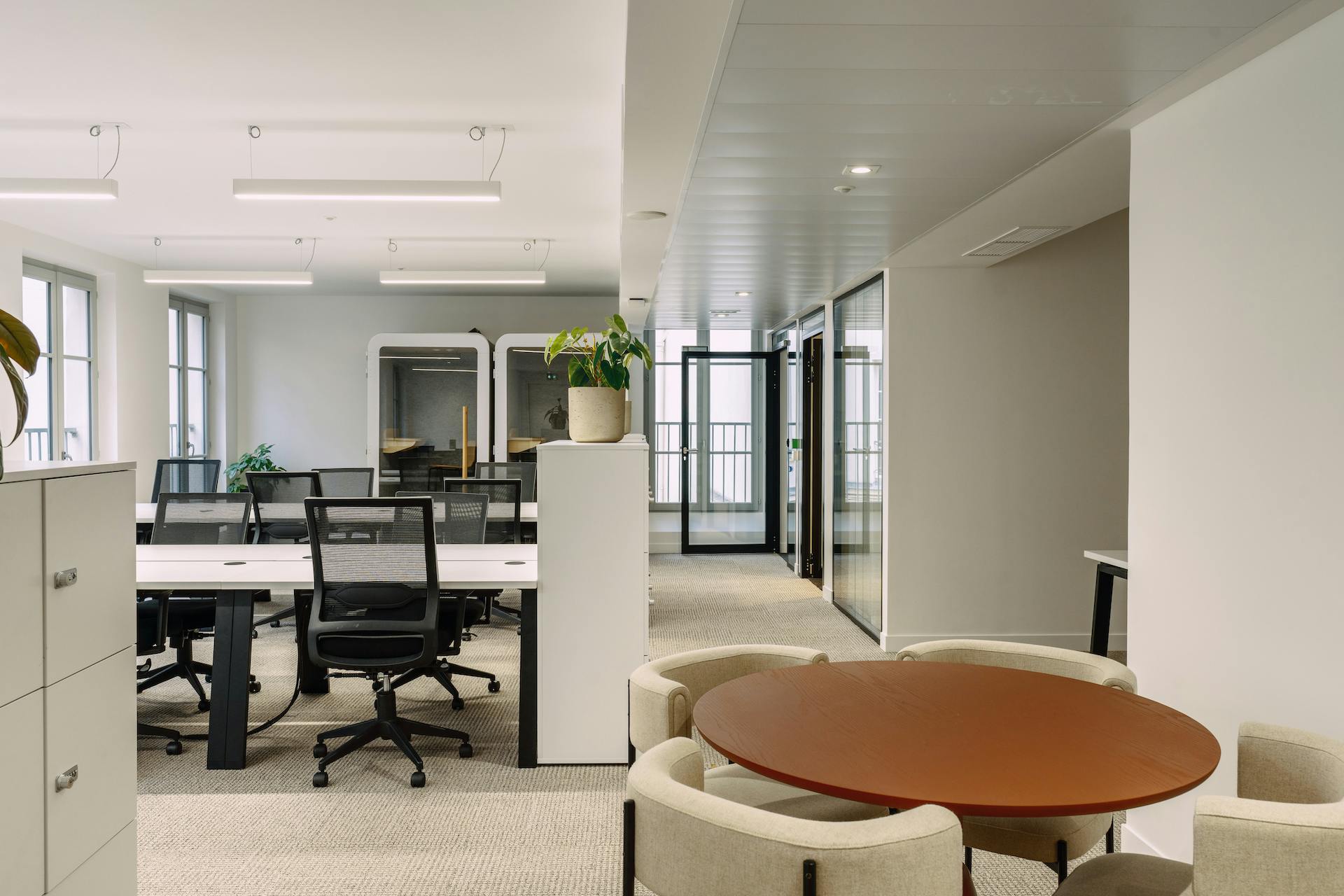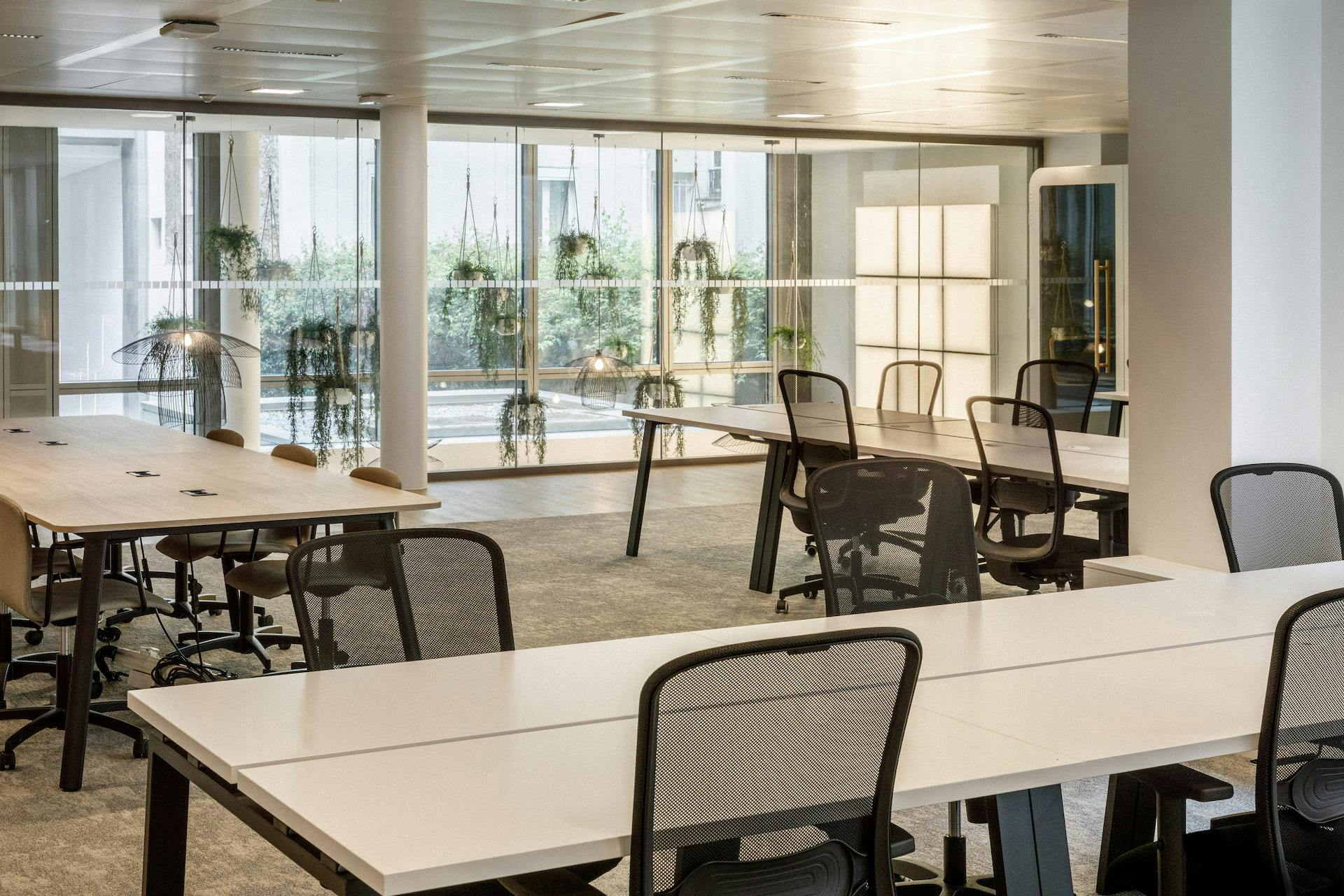

How to design a notary office?
Designing a notary office goes far beyond decoration or ergonomics: it is a question of trust, efficiency, and professional image. How can you create a space that inspires confidence, optimizes workflows, and complies with all legal and human constraints?
Here you will find practical advice, real-life examples, and common mistakes to avoid when designing a space that is professional, welcoming, and aligned with the challenges of today's notary profession. Whether you are an established notary, a future partner, or in charge of setting up a notary office, this article is designed to guide you in a simple and effective way.
Why is the layout of a notary's office a strategic lever?
Today, a well-designed space is a work tool in its own right. In a notary's office, it must fulfill several purposes:
- Convey rigor and serenity from the moment you walk in
- Create a climate conducive to discussion (often around sensitive topics such as inheritance, real estate sales, marriage contracts, adoption, asset management, etc.)
- Ensure complete confidentiality of discussions
- Streamline internal processes (signing of deeds, archiving, consultations)
Notaries no longer work in a rigid and impersonal environment. The space becomes a vehicle for customer relations and a factor in performance.
Key areas of a law firm: what functions, what expectations?
Case study: a 150 m² office layout
- Reception/secretarial area: visually accessible, with clear signage and storage space suitable for file management. A dedicated business phone line allows for the tracking of client calls.
- Waiting room: solid wood furniture (oak or mahogany), magazines on French law, calm and confidential atmosphere.
- Individual offices: for each notary or employee, an ergonomic workspace with custom-made furniture. Personalized executive office, comfortable armchair, secure storage.
- Signing room: central wooden table, digital equipment (electronic signature), comfortable seating for clients. A room designed to accommodate all types of situations (property, family, complex or tax matters).
- Back office space: for administrative staff, clerks, and employees. Open-plan or partitioned depending on the size of the team.
Note: some notary offices choose to install an archive room on the same floor, or a room dedicated to land registration.
Common mistakes to avoid
- Choosing furniture that is too old without enhancing it (e.g., a poorly restored 19th-century notary's desk can give an impression of dilapidation rather than authenticity)
- Neglecting the legal security associated with filing and access to documents
- Forgetting to make accommodations for people with reduced mobility
- Underestimating the role of natural lighting or acoustics in offices
Don't hesitate to surround yourself with a professional interior designer who can guide you from start to finish—from choosing the site to the final layout.
Create a reassuring customer experience
A notary's office is not just a place of work: it is also a welcoming space where customers should feel listened to, confident, and well supported. The customer experience begins as soon as they walk through the door, and every detail can help reinforce this feeling of security and professionalism.
Some concrete ideas:
- Work on the entrance: a welcoming reception area, clear signage, and a bright, well-organized space help avoid confusion and unnecessary stress.
- Make the waiting area comfortable: provide comfortable seating, a selection of reading material (law, real estate, property, etc.), a calm atmosphere, and soothing touches of greenery.
- Prioritize confidentiality: even in high-traffic areas, semi-open partitions, rugs, or well-positioned furniture can help preserve the privacy of conversations.
- Make spaces intuitive: each room should have a clear function. Clients should easily understand where to go, where to sit, and where to sign.
- Humanize the space: a few framed photos, a work of art, a symbolic object, or a local nod can make all the difference.
Inspirations and trends in 2025
- A return to authentic furniture (oak notary desk, restored antique armchair, period writing desk added to the list of decorative items)
- A mix of modern lines (glass, hanging light fixtures) and historical objects to highlight heritage
- Discreet greenery (green wall on the client side or plants at the base of glass partitions)
- Connected solutions (online appointment scheduling, digital document management, QR code reception)
Confidentiality and legal security
- Reinforced acoustic partitions
- Built-in safes for sensitive notarial deeds
- Secure access to certain areas via badge
- Protected computer network (GDPR, cloud system located in France)
In 2025, a notary office must guarantee legal confidentiality at all levels: oral exchanges, document transmission, physical and digital storage.
Legal requirements
A notary office is subject to certain obligations related to the exercise of its function:
- Accessibility for people with reduced mobility
- Clear signage (pictograms, name of the senior notary partner, opening hours, business phone number visible in the window)
- Compliance with public access legislation
- Archiving and land registration in accordance with best practice
Productivity and quality of service
- Integrate collaborative tools for employees
- Provide a secondary office for receiving individuals in complete discretion
- Install shared equipment for documents requiring multiple signatures
What kind of decor should a notary's office have?
- Solid wood or antique-style wood executive desk
- Antique objects: scales of justice, inkwells, or writing desk from the last century
- Works of art: French paintings depicting scenes of heritage transmission or notarial history
- Legal books displayed in a display case or wall bookcase
- Discreetly integrated modern elements: wall signage, tablet on the desk, interactive screen in the waiting room
The aim is to create a harmonious space that is both functional and aesthetic, and which reflects the history of notarial practice.
And what about Deskeo?
At Deskeo, we regularly assist professionals in designing their workspaces. The idea is to create offices that reflect their personalities, are comfortable and functional, and are designed to welcome their clients in the best possible conditions. From design to completion, we work hand in hand with our clients, offering customized solutions and providing concrete support at every stage. Discover our projects.
A space that matches your profession
Whether it's a modern notary office or a carefully restored old office, every detail counts to ensure a high-quality welcome, impeccable legal security, and a reassuring customer experience.
Are you a notary, working for a company, an employee, or a partner? Are you looking for a layout suited to your situation, in the suburbs or in the city center? Consider surrounding yourself with experts to make the right choices in terms of layout, furniture, and decoration.
Protecting assets, organizing family succession, supporting major life decisions: your workspace deserves the same level of excellence.

Contact Us
We find your Perfect fit!

